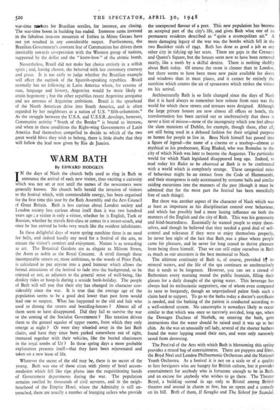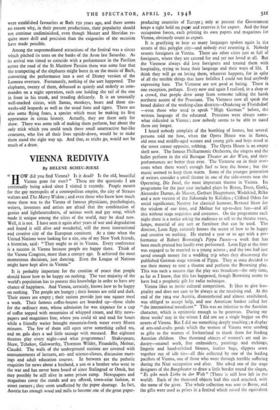WARM BATH
By EDWARD HODGKIN
IN the days of Nash the church bells used to ring in Bath to announce the arrival of each new visitor, thus exciting a curiosity which was not set at rest until the names of the newcomers were generally known. No church bells herald the invasion of visitors to the festival which, with commendable energy, has been organised for the first time this year by the Bath Assembly and the Arts Council of Great Britain. Bath is less curious about London society and London society less curious about itself than it was two hundred years ago ; a visitor is only a visitor, whether he is English, Turk or Russian, whether he travels first-class or comes in a motor-coach, and once he has arrived he looks very much like the resident inhabitants.
In these delightful days of warm spring sunshine there is no need for bells, and indeed hardly any need for a festival of the arts, to ensure the visitor's comfort and enjoyment. Nature is as rewarding as art. The Botanical Gardens are as elegant as Milsom Street, the Avon as noble as the Royal Crescent. A stroll through these incomparable streets or, more ambitious, to the woods of Prior Park, is calculated to put anyone into a good humour which allows the formal attractions of the festival to fade into the background, to be enjoyed or not, as adjuncts to the general sense of well-being, like donkey rides or hoop-la during a seaside bank-holiday. The people of Bath will tell you that their city has changed its character con- siderably since the war. It is true that the average age of the population seems to be a good deal lower than past form would lead one to suspect. What has happened to the old and halt who used to throng the streets and boarding-houses ? Almost all of them seem to have disappeared. Did they fail to survive the war or the coming of the Socialist Government ? Has taxation driven them to the genteel squalor of upper rooms, from which they only emerge at night ? Or were they wheeled away in the last Bath chairs, and have they since been parked somewhere out of sight, immured together with their vehicles, like the buried charioteers in the royal tombs of Ur? In these spring days a more probable explanation presents itself—that they have been rejuvenated and taken on a new lease of life.
Whatever the secret of the old may be, there is no secret of the young. Bath was one of those cities with plenty of hotel accom- modation which fell like ripe plums into the requisitioning hands of Government departments during the war. The population remains swelled by thousands of civil servants, and in the neigh- bourhood of the Empire Hotel, where the Admiralty is still en- trenched, there are usually a number of lounging sailors who provide the unexpected flavour of a port. This new population has become an accepted part of the city's life, and gives Bath what one of its permanent residents described as "quite a cosmopolitan air." A more damaging legacy of the war was the bombs which fell in the two Baedeker raids of 1942. Bath has done as good a job as any other city in tidying up her scars. There are gaps in the Crescent and Queen's Square, but the houses seem now to have been removed neatly, like a tooth by a skilful dentist. There is nothing shabby about Bath today. Of course the stone is cleaner than in London, but there seems to have been more new paint available for doors and windows than in most places, and it cannot be entirely the sunshine which creates the air of spruceness which strikes the visitor on his arrival.
Architecturally Bath is so little changedsince the days of Nash that it is hard always to remember how remote from ours was the world for which these streets and terraces were designed. Although the large private houses are now almost all offices or hotels, the transformation has been carried out so unobtrusively that there is never a hint of misuse—none of the incongruity which you feel about the slum mansions of Dublin, for example, though these, after all, are still being used in a debased fashion for their original purpose as homes for people to live in. Beau Nash himself has passed into a figure of legend—the name of a cinema or a teashop—almost as mythical as his predecessor, King Bladud, who was Romulus to The city of which Nash was later to become the Augustus. The particular world for which Nash legislated disappeared long ago. Indeed, to read today his Rules to be observed at Bath is to be confronted with a world which is completely strange. These categorical rules of behaviour might be an extract from the Code of Hammurabi, and their strangeness is only accentuated by costume balls and similar raiding excursions into the manners of the past (though it must be admitted that for the most part the festival has been mercifully free of such things).
But there was another aspect of the character of Nash which was at least as important as his disciplinarian control over behaviour, and which has possibly had a more lasting influence on both the manners of the English and the city of Bath. This was his generosity and kind-heartedness. Essentially he wanted people to enjoy them- selves, and though he believed that they needed a good deal of self- control and tolerance if they were to enjoy themselves properly, he never lost sight of the fact that Bath „was a place where people came for pleasure, and he never for long ceased to derive pleasure from being there himself. That we can still enjoy ourselves in Bath as much as our ancestors is the best memorial to Nash.
The ultimate continuity of Bath is, of course, provided b7 its mineral waters, and the life of the spa continues so unobtrusively that it tends to be forgotten. However, you can see a crowd of Bathonians every morning round the public fountain, filling their glasses for a daily draught of the spring water. This beverage has always had its enthusiastic supporters, one of whom even compared its taste to burgundy, though an unprejudiced palate finds such a claim hard to support. To go to the baths today a doctor's certificate is needed, and the bathing of the patient is conducted according to a well-ordered system. No catastrophe is nowadays likely to occur similar to that which was once so narrowly avoided, long ago, when the Dowager Duchess of Norfolk, on entering the bath, gave instructions that the water should be raised until it was up to her chin. As she was an unusually tall lady, several of the shorter bathers found the water lapping round their ears, and were only narrowly saved from drowning.
The Festival of the Arts with which Bath is blossoming this spring provides a mixed bag of entertainment. There are puppets and films, the Boyd Ned and London Philharmonic Orchestras and the National Youth Orchestra. As a festival it is not on a scale or of a quality to lure foreigners who are hungry for British culture, but it provides entertainment for anybody who is fortunate enough to be in Bath, and an excuse for anybody who wishes to go there. The Theatre Royal, a building second in age only to Bristol among British Theatres and second in charm to few, has an opera and a comedy on its bill. Both of them, Ii Seraglio and The School for Scandal, were established favourites at Bath 150 years ago, and there seems no reason why, in their present productions, their popularity should not continue undiminished, even though Mozart and Sheridan re- quire more drill and precision than the exigencies of the occasion have made possible.
Among the unpremeditated attractions of the festival was a circus which pitched its tents on the banks of the Avon last Saturday. As its arrival was timed to coincide with a performance in the Pavilion across the road of the St Matthew Passion there was some fear that the trumpeting of the elephants might burst in on the music of Bach, converting the performance into a sort of Disney version of the Leonora overture. Fortunately, nothing of the sort happened. The elephants, twenty of them, debussed as quietly and orderly as com- mandos on a night operation, each one holding the tail of the one in front in his trunk, and treading delicately. It is an unusually well-stocked circus, with llamas, monkeys, bears and three six- weeks-old leopards as well as the usual lions and tigers. There are also some flying foxes, a species which must be making its first appearance in circus history. Actually, they are there only for show. There was some talk of making them perform, but about the only trick which you could teach these small unattractive bat-like creatures, who live all their lives upside-down, would be to make them stand the right way up. And that, as tricks go, would not be much of a draw.































 Previous page
Previous page